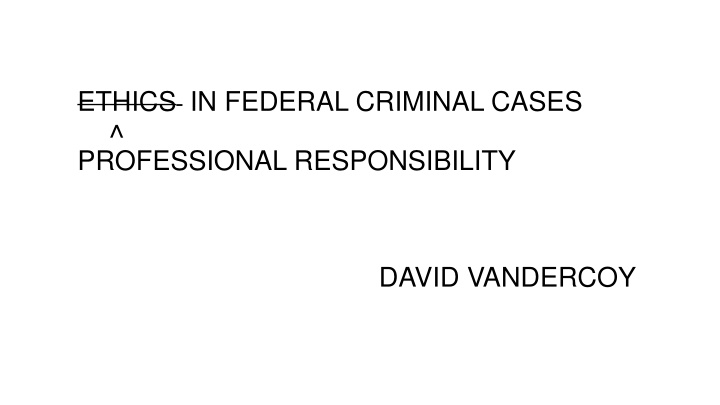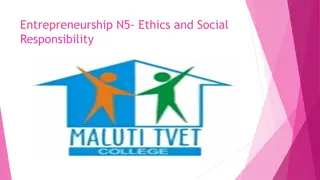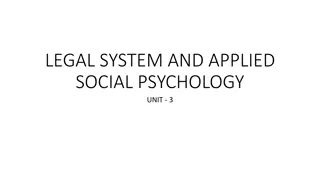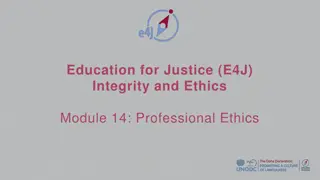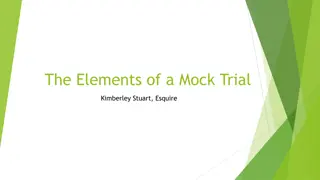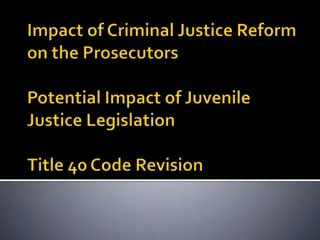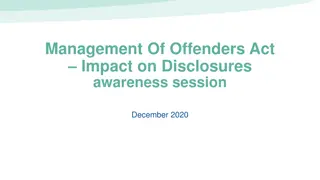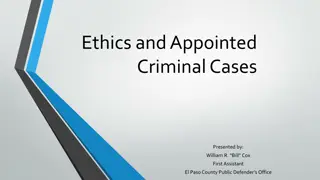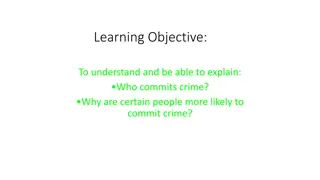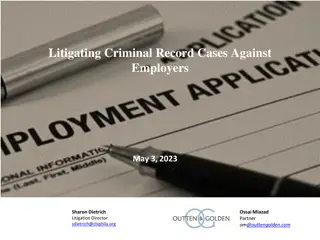Professional Responsibility and Ethics in Federal Criminal Cases
Understand the ethical considerations and rules that guide lawyers in federal criminal cases, including the importance of maintaining fairness, avoiding prejudice, and balancing the rights of clients with public interest. Explore cases like Gentile v. State Bar of Nevada and learn about the allocation of authority between lawyers and clients. Uphold the principles of competency, integrity, and responsible advocacy within the legal profession.
Download Presentation

Please find below an Image/Link to download the presentation.
The content on the website is provided AS IS for your information and personal use only. It may not be sold, licensed, or shared on other websites without obtaining consent from the author.If you encounter any issues during the download, it is possible that the publisher has removed the file from their server.
You are allowed to download the files provided on this website for personal or commercial use, subject to the condition that they are used lawfully. All files are the property of their respective owners.
The content on the website is provided AS IS for your information and personal use only. It may not be sold, licensed, or shared on other websites without obtaining consent from the author.
E N D
Presentation Transcript
ETHICS IN FEDERAL CRIMINAL CASES PROFESSIONAL RESPONSIBILITY DAVID VANDERCOY
Ethics (Webster) Rules of behavior based on ideas about what is morally good or bad. Some of the rules governing lawyers have a moral basis; most do not.
1) Trial Publicity N.D. Ind. L. CR. R. 53-2 - must not release facts or opinions about the criminal case if - to be disseminated by public communication - pose serious and imminent threat to fair administration of justice
N.D. Ind. L. CR. R. 53-2 (cont). - presumptions of imminent threat - opinions re: guilt or innocence or the evidence permitted statements - help apprehending suspect - warn public of dangers - scheduling - w/o comment or elaboration - defendant denies; general nature of defense -
Then Model Rule 3.6 prohibited attorneys from making any extrajudicial statements that would materially prejudice proceedings. First Rule 1.1 A lawyer shall provide competent representation to a client.
Gentile Lawyers Political Speech is protected by 1st Amendment - Words directed at public officials and their conduct - Public vigilance is a restraint on abuse of judicial power
Lawyers duties do not begin inside courtroom door defense attorney - may take reasonable steps to reduce adverse consequences of indictment - including attempt to demonstrate innocence in the court of public opinion
2) Allocating Authority between a client and a lawyer Faretta v. California, 422 U.S. 806 (1975) Jones v. Barnes, 463 U.S. 745 (1983) RS (Third) of Law Governing Lawyers
Tension It s the client s case vs. The lawyer is the trained advocate
Client - - - - whether to settle how a defendant should plead waive jury trial whether a criminal defendant should testify whether to appeal (civil or criminal) -
Client - whether to represent self - Faretta
Lawyer decides - - - - which witnesses to call to cross and how which motions to file accept/strike jurors Lawyer must keep client reasonably informed and consult concerning decisions to be made by lawyer RS (Third) of Law Governing Lawyers 20
3) Role of Standby Counsel Faretta accused has right to personally make his defense - can terminate for deliberate disruption - can appoint standby to assist accused if and when accused requests help
Two Types - assist accused v serves on behalf of court to protect the integrity and continuity of the proceedings -
McKaskle v. Wiggins, 465 U.S. 168 (1984) - - - Wiggins proceeding pro se Standby counsel appointed Wiggins requests Standby not be allowed to interfere then requested trial not proceed unless Standby present conferred with Standby in midst of cross - -
McKaskle v. Wiggins, 465 U.S. 168 (1984) cont. - - - Wiggins convicted said Standby unfairly interfered 5thCir. Standby is to be seen but not heard
S.Ct. Faretta right protected when Defendant had a fair chance to present his case in his own way T.Ct. can appoint standby counsel over defendant s objection
- pro se defendant entitled to preserve actual control over the case - counsel s participation w/o defendant s consent should not be allowed to destroy jury s perception that defendant is representing himself.
- The appearance of a pro se defendant s self-representation will not be undermined by counsel s participation outside the presence of the jury
Faretta rights vindicated outside presence of jury if defendant allowed to address court freely and disagreements between counsel and pro se defendant resolved in defendant s favor.
Participation in presence of jury excessive involvement by counsel will destroy pro se appearance
HOWEVER: Faretta rights not infringed when Standby counsel assist pro se defendant in overcoming routine procedural or evidentiary obstacles such as introducing evidence or objecting to testimony.
Constitution does not require judges to take over for a pro se defendant that would normally be attended to by trained counsel. Participation by Standby counsel to accomplish as much as permissible.
4) Taking Possesson of Evidence Lawyer should not be a repository for the fruits/instrumentalities of crime
- Defendant s counsel may take evidence for testing - If you interfere with State s ability to find - must turn over - Restore its evidentiary value People v. Meredith, 631 P.2d 46 (Calif. 1981)
5) Dealing with persons other than clients
4.4 Unrepresented Persons - lawyer shall not state or imply that lawyer is disinterested - if lawyer should know the unrepresented person misunderstands lawyer s role, lawyer should correct
4.1 Lawyer shall not knowingly make a false statement of material fact to a third person
Cases Lawyer violates rule by befriending or having a third person befriend witness by subterfuge - Philadelphia Bar, Assoc. Prof. Guidance Comm. Opinion 2009-02 - In re Gatti, 8 P.3d 966 (Or. 2000) - Brockler, 2016 BL 66525, (Ohio)
Deceitful subterfuge does not violate - Virginia State Bar, Opinion 1845 (2009) (state bar counsel directed third person to engage in covert investigation re: unauthorized practice of law a crime) - Wisc, Rule 4.1(b) Lawyer may advise or supervise others with respect to lawful investigative activities. - Oregon rule change
Good Summary at Pa. Eth. Op. 2014-300, 2014 WL 10383869
6) Candor to Court v. Confidentiality Model Code Confidentiality Trumped Candor Model Rules Candor (Rule 3.3) Trumps Confidentiality (1.6)
Confidentiality (1.6) - Lawyer shall not reveal info. related to rep d unless client gives informed consent Lawyer may reveal (1) to prevent death or substantial bodily harm . . . (6) to comply with court order -
Candor (3.3) Lawyer shall not - - - make false statements offer evidence lawyer knows is false if lawyer has offered remedial measures including disclosure required client has 5thAmendment right to testify witnesses do not - -
- If client lies to court, you are obligated to fix - If you know a witness is going to lie, you should not call
Disclosing/Not disclosing whereabouts of fugitive client or Do you have any idea why your client isn t here?
San Diego Bar Legal Ethics Opinion 2011-1 Client s mother called lawyer the night before and said Don t expect to see client tomorrow, he just left the house high as a kite.
- - - Privilege v. confidentiality No false statements v. duty to disclose answering questions v. complying with order S.D.Fla. case says disclosure required 1990 WL 446957 (July 15, 1990) in limited circumstances Majority contra - -
7) ATTORNEY/CLIENT PRIVILEGE No privilege if - client sought services to enable or aid to commit, or plan to commit what client knew, should have known was a crime (what lawyer knew not relevant to attorney-client priv. issue
No privilege if (cont.) - breach of duty by lawyer or client - as to a communication relevant to an issue concerning an attested document to which lawyer is attesting witness - Joint clients if communication made by one to lawyer consulted in common in action between clients
ATTORNEY-CLIENT privilege protects conversations between attorney and prospective clients jointly interviewed No privilege in Joint Defense agreements, each defendant represented by own attorney, one defendant makes statements to lawyer for other defendant.
8) Responding to Ineffectivness Claims 1.6 Confidentiality waived only to extent necessary to respond to claims Divide is whether disclosures must be in a judicial setting
ABA Comm. on Ethics & Prof. Resp. Formal opinion 10-456 unlikely that disclosure prior to a court supervised response will be justifiable.
- Disciplinary proceedings against Thompson, 847 N.W.2d 793 (Wisc. 2014) When client claims lawyer ineffective, attorney-client privilege is waived; lawyer response not confined to court- supervised.
9) Who owns the file - Indiana 1.16 Upon termination, lawyer shall surrender papers and property - Indiana recognizes retaining lien the right to retain property until professional fee is paid.
10) Withholding documents/information from client RS 46 (d) On request, lawyer must allow client to inspect/copy any document relating to rep, unless substantial grounds exist to refuse.
Discovery restrictions on dissemination to criminal client can be imposed by rule, court order, or agreement.
11) Representing the Mentally Impaired Client - Rule 1.14 Client with Diminished Capacity - ABA Criminal Justice Section Standards, Mental Health 7-4.2 Responsibility for raising the issue of incompetence to stand trial Mental competence to plead guilty or nolo contendere 7-5.1
